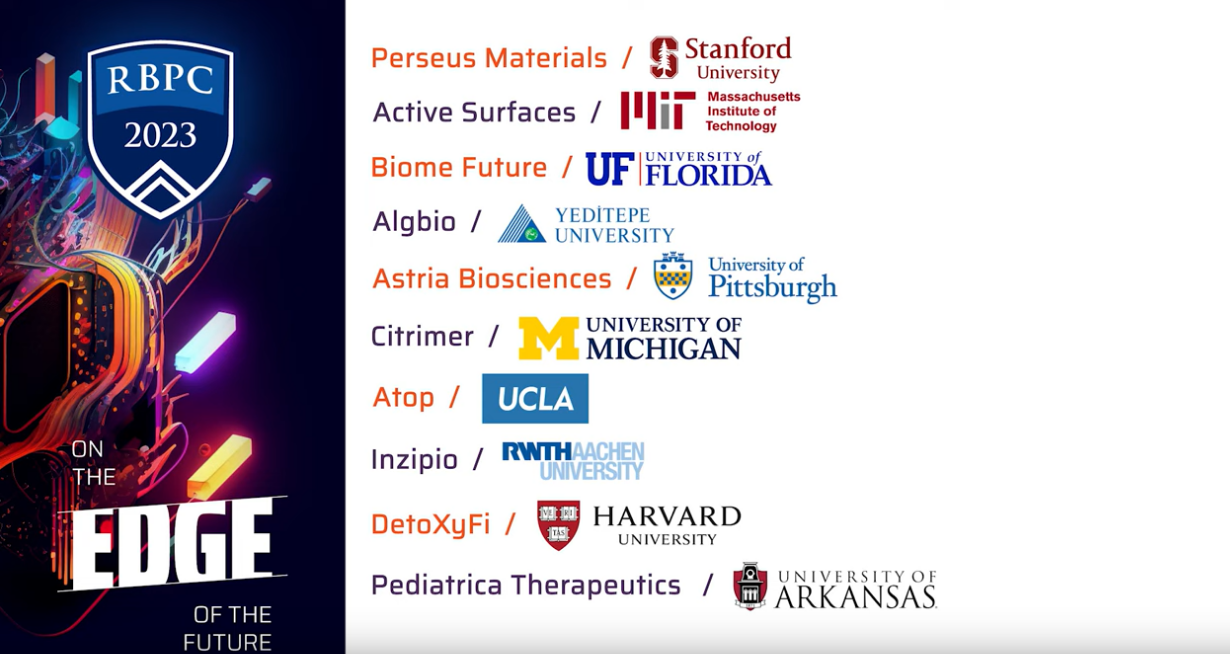Brain aneurysms can appear without any prior symptoms. Diagnosis is invasive and expensive. Monitoring progression can be a guessing game. And if they rupture, which happens to about 30,000 people in the U.S. each year, there is only a 50/50 chance of making it to a hospital alive.
Roughly a third of those who do make it to the hospital alive never leave, and those that do often face lifelong disabilities.
A Pitt Department of Neurosurgery resident and a third-year School of Medicine student, want to bring a new blood test for brain aneurysms to market that can accurately and less invasively detect brain aneurysms and measure the risk of rupture, giving clinicians much more direction in determining when to provide treatment.

Working with the Pitt Innovation Institute, part of the Office of Innovation and Entrepreneurship, they formed a company, Astria Biosciences, to bring the test to market. Recently, the students, Adi Mittal and Rob Dembinski, participated in the Rice Business Plan Competition, in Houston, TX, which bills itself as the largest graduate student pitch competition in the nation. They manage to reach the top 14 semi-finalists of 42 teams.


Both Nowicki and Mittal credit the support they have received at Pitt for giving them the tools and the training to become academic entrepreneurs.
“The University of Pittsburgh has created an amazing ecosystem for fostering innovation and entrepreneurship,” Nowicki said. “With the help of the people like (Innovation Institute entrepreneur in residence) Dan Broderick and Rhonda Schuldt (director of the Big Idea Center) and others, we have been able to grow as entrepreneurs.”
Nowicki and Mittal’s commercialization journey began in the Innovation Institute’s First Gear program, where teams interview potential customers to find what their pain points and unmet needs are and begin to fashion a value proposition for solving those problems.
Mittal then competed in the Randall Family Big Idea Competition at the Big Idea Center, the university’s hub for student innovation and entrepreneurship, taking a second-place prize.
They followed that by competing in the Innovation Institute’s Michael G. Wells Student Healthcare Competition, funded by Pitt alumnus Michael Wells. They entered the competition initially in 2021 but didn’t win a prize. Mr. Wells advised them to sharpen their go-to-market strategy. After re-calibrating their approach to focus solely on a diagnostic product, they won the top prize. They also took the top prize at the 3Rivers Venture Fair University Showcase in February of this year.
Mittal is hoping to continue their impressive run of obtaining funding to accelerate their innovation on the path to market when he ventures deep into the heart of Texas.
“Pitt has had a strong showing in (pitch) competitions. (Pitt startup) HEARTio just won the Tulane Business Model competition last month. We have tried to learn from our colleagues. We’re hoping to walk away with something at Rice,” Mittal said.
Pitt teams have stood out at the Rice competition in recent years. Last year Hoth Intelligence, which is developing an artificial intelligence-powered virtual reality headset to allow clinicians to see “through and into” patients, won a second place prize of nearly $400,000.
In 2021, team SimpL, now APEX Health, won a $30,000 runner-up prize.
In 2017, Forest Devices, founded by former Pitt School of Medicine student Matthew Kesinger, won the top prize of $600,000 for its development of a stroke detecting device.
For Nowicki, developing more effective methods to diagnose and treat brain aneurysms has motivated his progression, both as a researcher and a physician
“I came to Pitt because it is the top neurosurgery residency in the country, in my opinion,” said Nowicki, who had studied the influence of inflammation on brain aneurysms while in medical school.
Once at Pitt, he would spend his spare time at nights and on weekends in the lab of Robert Friedlander, head of the Neurosurgery Department and co-director of the UPMC Neurological Institute, looking for molecular markers for aneurysms.
He discovered that cerebral aneurysms are mediated by specific cytokines – immune system signaling proteins that promote inflammation. He developed a test he calls CAT-7 that uses the levels of a combined seven cytokines to create a “fingerprint” that diagnoses an aneurysm and assign it a risk score. In preclinical testing, the CAT-7 test reports greater than 95 percent accuracy.
Their multi-disciplinary team is complemented by several other investigators: Rob Dembinski, who recently completed an economic analysis suggesting such a test would be a life-saving measure in the US healthcare system; Ali Alattar, a neurosurgery resident who worked on software development; and Michael McDowell, a junior faculty member who started the aneurysm tissue bank. Nowicki also praised their Pitt undergraduate student researchers, Rohit Mantena and Catherine Cao, stating they “couldn’t have done this project without their help."
“We have been working with the Astria team for about two years through our First and Second Gear programs and various innovation competitions,” said entrepreneur in residence Broderick. “They have taken full advantage of the resources Pitt has to offer to those who want to achieve impact for their innovation. Whatever happens at Rice, we look forward to helping them stay focused and on track as they progress on their commercialization journey.”
Nowicki said the company’s next step will be to license the technology from the university sometime in the next few months. They are also gearing up for a study of the CAT-7 test on 200 patients.
“When you talk to patients and their families, everybody wants to help to make the next person’s health outcome better. It’s great to see,” he said.
If you are a Pitt faculty or student working on Pitt sponsored research and are ready to start your commercialization journey, you can take a free month-long NSF I-Corps short course. They are scheduled to start every few weeks, so there is sure to be one to fit your busy schedule. Learn more and apply.